
Unclaimed Money Lookup - West Virginia
Free West Virginia Unclaimed Money Lookup
We receive referral fees from partners (advertising disclosure)
The information we provide you is free of charge and a result of extensive research by our home warranty experts. We use affiliate links on our site that provide us with referral commissions. While this fact may not influence the information we provide, it may affect the positioning of this information.
(advertising disclosure)
The information we provide you is free of charge and a result of extensive research by our home warranty experts. We use affiliate links on our site that provide us with referral commissions. While this fact may not influence the information we provide, it may affect the positioning of this information.

West Virginia Unclaimed Money -
The Ultimate Guide 2025
- UPDATED May 2025
Learn what the Mountain State does with unclaimed property and how to claim it in our ultimate guide to West Virginia.
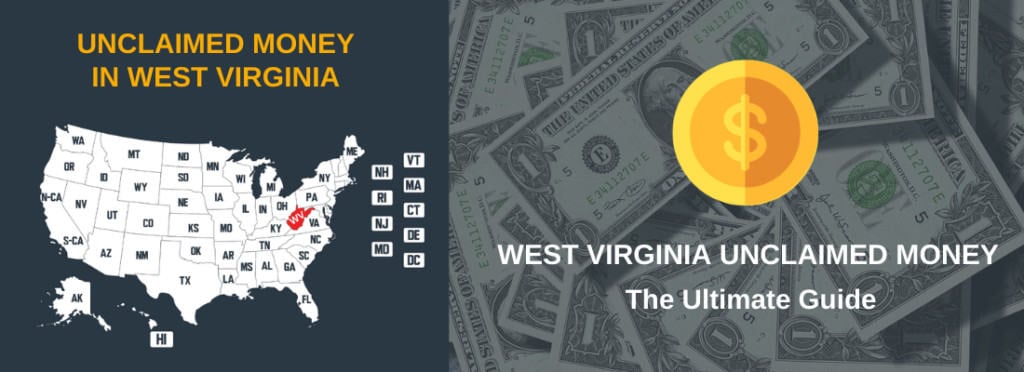
Contents
- Your Guide to Unclaimed Property in West Virginia
- What is Unclaimed Money?
- What Amount of Unclaimed Assets are in West Virginia?
- How to Find Unclaimed Money in West Virginia
- Filing if You're Not the Owner
- How to Claim West Virginia Assets
- Are There Sites That Help You Find Unclaimed Money Outside of West Virginia?
- Unclaimed Property Laws in West Virginia
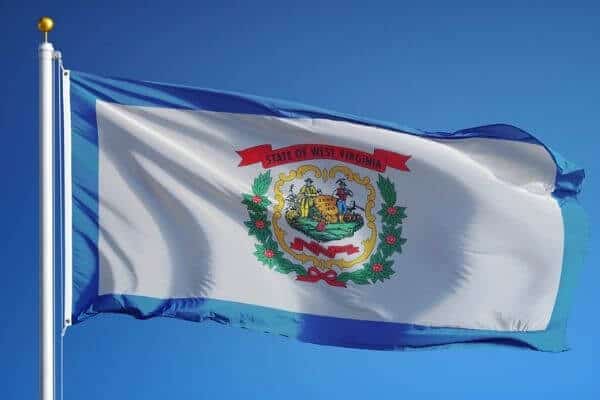
Your Guide to Unclaimed Property in West Virginia
Find Your Unclaimed Property is the name of a website introduced by the West Virginia State Treasurer as a way to help users more quickly and easily find their lost assets. The treasurer unveiled the website in 2020 to aid people on their searches as they could not visit the office in person due to the COVID-19 pandemic. As of April 2021, the site returned more than $200,000 to people who filed claims through the system. You can be one of the lucky ones who finds money on the site, too.
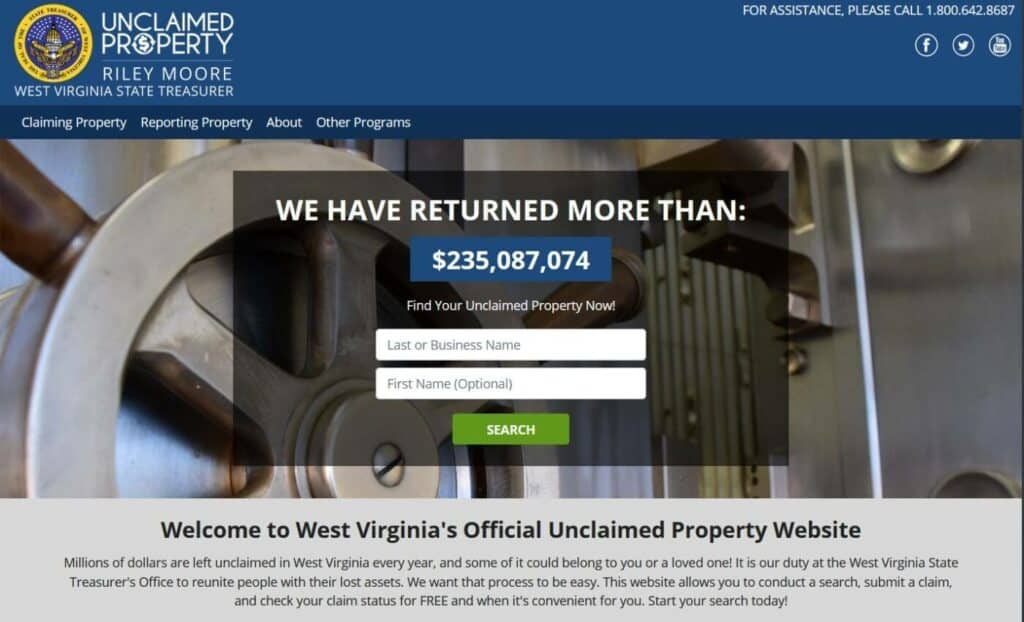
Our ultimate guide to unclaimed money in West Virginia helps you understand what unclaimed property is and why those assets go missing. You can read through our steps on how to use the Mountain State site to find your money and then check out the steps needed to file for your accounts. Whether you live in Morgantown, Huntington, Charleston or any other city, you have the right to search the site. The site is even open to those who left West Virginia but thinks that the state still has money for them. Find all of the assets that West Virginia lets you claim today.
What is Unclaimed Money?
Unclaimed property refers to any type of asset or account that has a monetary value that the owner abandons. Many people think that abandonment means that they ignored or forgot about an account for decades. Most institutions and organizations will only hold your money for one to three years. They want to avoid the hassles of caring for your asset, which is why they turn to the treasurer for help. The treasurer lists the money online and allows owners to claim them. Some of the assets that you come across belong to deceased owners that their heirs can claim.
Stocks and bonds are some unclaimed property types held by the West Virginia Treasurer. When you buy stocks, you receive certificates that you can use to show proof that you own them or redeem them for cash.
If you do not touch the certificates, they will become abandoned. This gives the state the right to sell them on the open market and give you a check for their value, which might be less than you expect. The contents of abandoned safe deposit boxes are another example of the unclaimed property found in the Mountain State.
When you receive a check from an organization or business, it is often only valid for six months or 180 days after the date listed on it. If you do not cash the check, the entity that wrote it may hand it over to the state and allow the state to track you down. You might lose track of a check that you put in a desk drawer or never get one because it went to the wrong address.
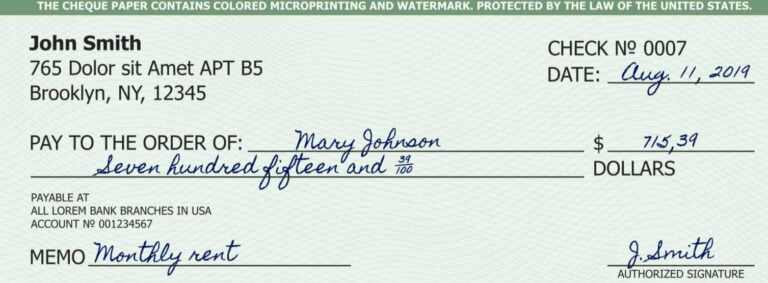
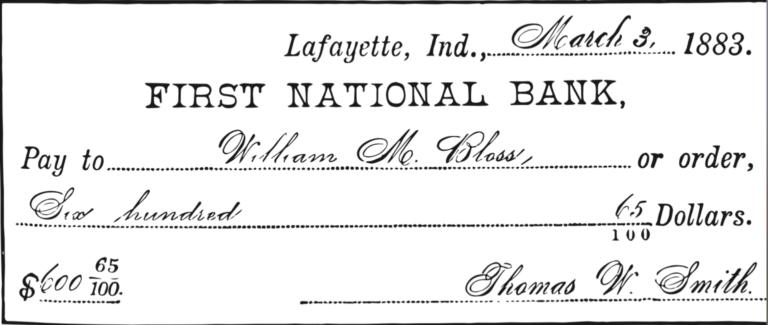
This can include both checks from your employers as well as those sent by companies such as your energy supplier.
West Virginia also lets you search the Find Your Unclaimed Money website for insurance checks. Payments sent to loved ones are among the more common checks found. As a beneficiary, you receive the total amount held by a life insurance policy when the person who bought the policy passes away. You may find checks sent by your insurer or other insurers after a car accident, too. Those checks often cover the expenses that you faced and any medical bills that you had.

In West Virginia, the treasurer will only accept unclaimed property and list it in the database if the holder can prove that they tried to find the person who owns the asset. A holder can refer to the bank that oversaw your checking account or an insurer who handled your auto insurance policy. West Virginia requires that holders make at least one attempt to contact the owner. If the owner passed away, the holder must try to locate their heirs. Only after their attempts fail and they fill out all of the required paperwork will the treasurer become the holder of the property.
What Amount of Unclaimed Assets are in West Virginia?
The West Virginia State Treasurer claims that it has more than $200 million in unclaimed assets listed within its system. While some accounts have a value of a few hundred dollars or less, others are worth significantly more. When you use some of the other resources that we listed below, you can search for more than $42 billion in unclaimed property. Other states along with government agencies and other organizations hold those funds.
How to Find Unclaimed Money in West Virginia
The best place to look for unclaimed money in West Virginia is on the Find Your Unclaimed Property website operated by the treasurer. This website helps you find any forms that you might need and upload your documents. It takes just a few steps to find your assets online.
Step 1: Visit the Search for Unclaimed Property page on the official website. Though you’ll see a search box on the homepage, this page makes it easy for you to do a quick search.
Step 2: To search for business assets, type the name of your business in the top box. Most of our readers will use their last name in this box. You can add a property ID if West Virginia sent you a notice or the name of the city where you live or lived. If you have a common last name and think that you’ll get a lot of results, we suggest adding your first name, too.
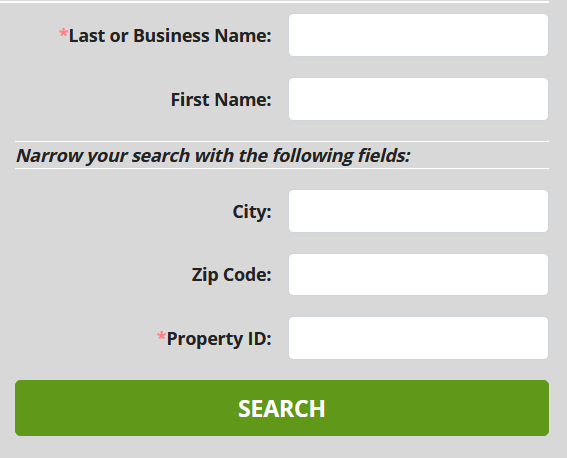
Step 3: Use your search results to find your property. West Virginia does not include as much information as other states do. It simply shows you the owner’s name and city along with the property ID number. Some assets will only list the last name of the owner.
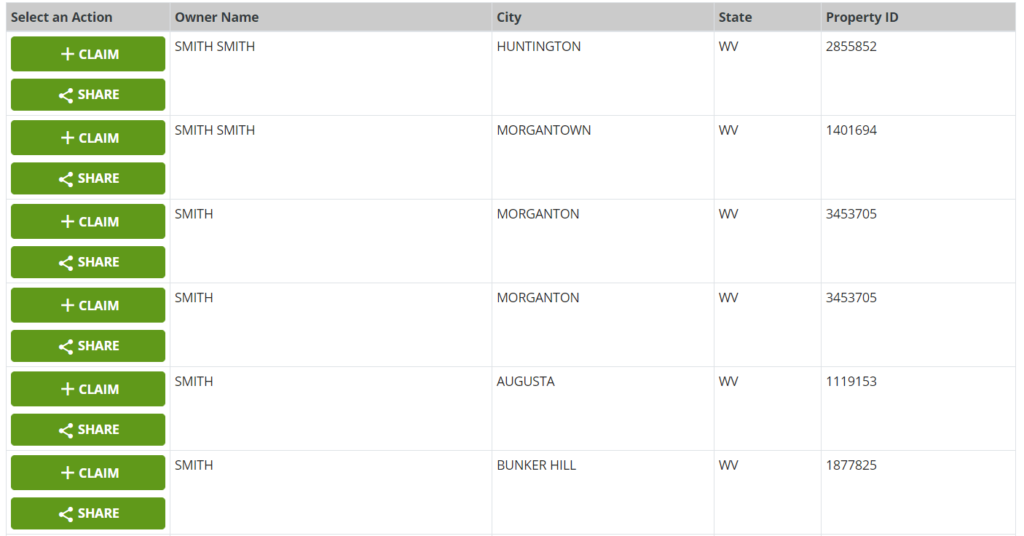
Step 4: To claim a West Virginia property, click on the “+Claim” button, which is in the column on the left side. We recommend looking at all the listed claims and clicking on all of those that you want to file for to cut down on the time that it takes to claim them. You’ll then click on the button labeled “View Property” to see what you claimed.
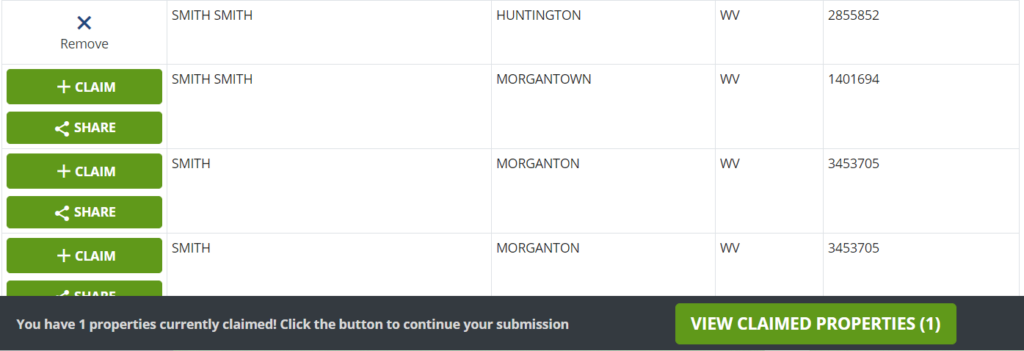
Step 5: Look for the “Claimant Relationship” section on the next page. Click on the drop-down menu below this section and choose the “Owner” listing. You may need to choose a different relationship based on how you want to file. Now is also a good time to make sure that your information matches what you see attached to the claim.

Filing if You're Not the Owner
Not everyone who uses the West Virginia website files for property as the sole owner. This option is only available to those who appear as the listed owner of the property. If you are a deceased person’s heir, the Mountain State gives you three ways to file. The first is “Heir – No Estate,” which you can use if you are the deceased’s only beneficiary and do not plan on using probate for their estate. As an executor going through probate, you can use the “Heir – Open Estate” option. The “Heir – Closed Estate” allows heirs to file claims once they finish probate.
West Virginia also has a “Trust” option designed for those named as a trustee of a trust that owns property. With the “Legal Representative” option, you can claim property as the guardian or custodian of an individual. There are also “Open Business” and “Closed Business” options for those who need to take over business assets. The way that you file will determine what type of information the state needs.
How to Claim West Virginia Assets
Once you show how you want to file, you’ll need to complete a few more steps to claim your asset.
Step 1: Supply West Virginia with all the information that it requires. You need to add your current address and phone number as well as an email address and social security number. West Virginia will only use your SSN number to process your claim.
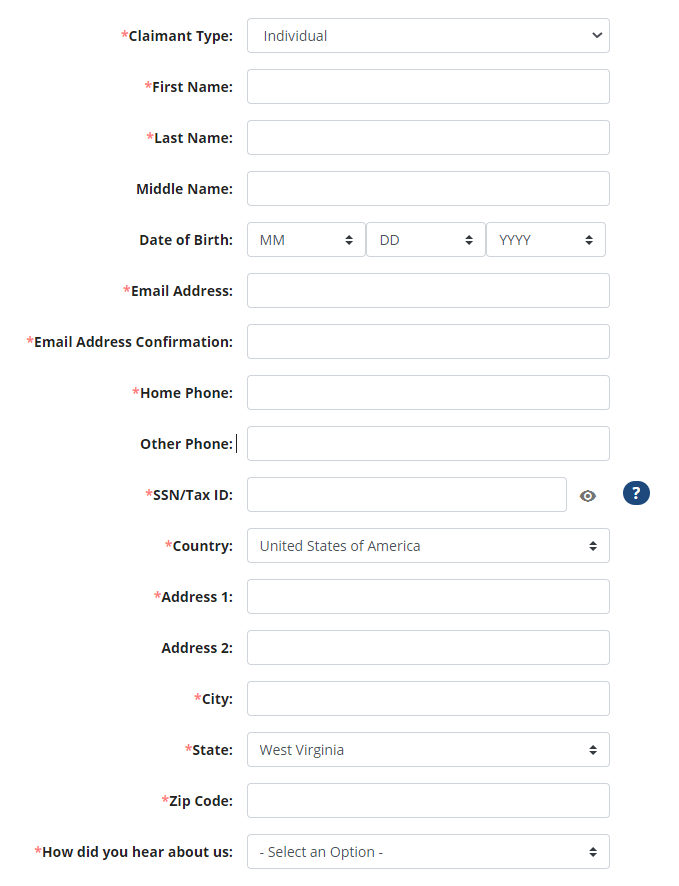
Step 2: Look over your claim on the preview page. The state recommends that you go back to correct any mistakes. If it finds mistakes after you file, you may need to start over again.

Step 3: Find your social security card and photo ID. Take photos of both and upload them to your computer. Visit the Find Your Unclaimed Property Upload Documents page. You need to enter your email address in the two boxes shown and add the claim ID number to the other two boxes.

Step 4: Click on the blue button labeled “Add Document,” which lets you find the image that you want to add. As soon as you click on the file, it will automatically add it to your claim.
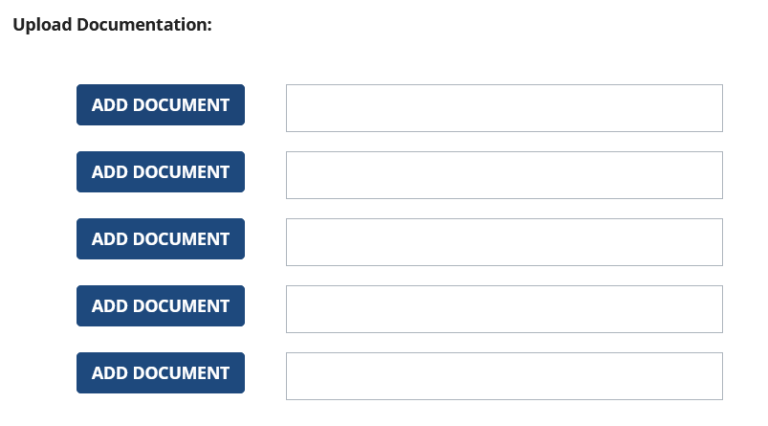
Step 5: Scroll to the top of the page to find the electronic disclosure section. Checking the box next to this section shows that you shared valid information. You will then need to press the “Submit” button to send the information to the West Virginia State Treasurer.
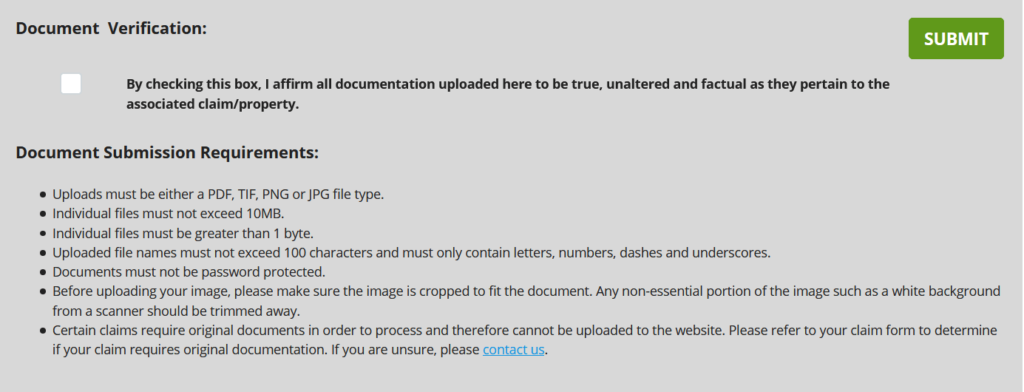
Are There Sites That Help You Find Unclaimed Money Outside of West Virginia?
Though the West Virginia website is the best way to find unclaimed property held by the treasurer, it is not the only site that helps you find abandoned assets. You may want to check Federal Deposit Insurance Corporation to see what happened to the assets held by a bank that shut down. The FDIC gives you the option of looking for accounts listed in your name and seeing how you can claim them. You can also use the National Credit Union Administration to track assets that you placed in the hands of a credit union. Both sites will let you know which state database or government resource has your money.
Many people find money available for them from the Internal Revenue Service (IRS), which issues checks during the busy tax season. If you paid more than you owed in the last year, you earn a refund check. You may not get that check because you didn’t put the right address number on your return or moved after you filed. The IRS helps you set up a free account and update your contact information. You can then have a missing refund check sent to your current bank account.
Other sites that we suggest using as you look for abandoned property inside and outside of West Virginia include:
- U.S. Federal Investments: This website can help you claim a mature bond issued by the treasury department. Many people buy these as investments for young children that allow them to exchange the bonds for cash later. You do not need the official bond or certificate to claim your money.
- Missing Money: To search for property held in West Virginia and other states, check with Missing Money. This website serves as the main database for multiple states and lets you search for assets in Canada. Depending on the state, the site may accept all of your information and process your claim or simply send your information to a state that will contact you later.
- Department of Veterans Affairs: Many people have money that the VA holds that they do not know about. This is common with life insurance policies acquired by veterans. The VA can help you find those policies and claim any other benefits that you can get.
- U.S. Railroad Retirement Board: The U.S. Railroad Retirement Board can help you find retirement funds left behind when the person who started the fund passes away. You can then claim the remaining cash for yourself or another beneficiary.
- Department of Housing and Urban Development (HUD): HUD offers loads of help for those who want to buy a home and those who own homes. Depending on the help that you got, HUD may have a refund check that it sent to you and got back, which you can still claim.
- Pension Benefit Guaranty Corporation: Try using this resource if you want to find out if someone you loved had a pension that they didn’t use. Heirs can often claim the remaining funds and have the money either sent to them or transferred to a new retirement account.
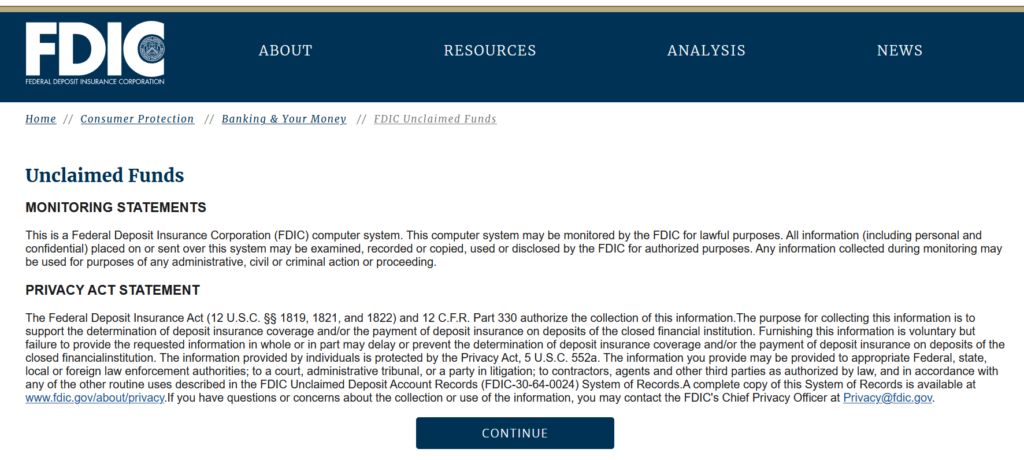
Unclaimed Property Laws in West Virginia
The West Virginia Uniform Property Act Laws and Regulations is a page on the Find Your Unclaimed Property website that lets you check on the rules and laws in the state. You may want to see how long an institution has before it can claim that you abandoned your property or see if you have the chance to get an asset back before it goes to the treasurer.
West Virginia Unclaimed Money FAQs
What Should You Do if You Find Property That Someone You Know Owns?
Using the West Virginia system may result in you finding abandoned property that a family member or friend owns. Though you cannot claim the asset for them, you can use the “Share” button to tell them about it. This button is right below the “Claim” button in your search results. When you click on it, the site allows you to send the claim to another person via email.
Does the Mountain State Require Notarized Documents?
Notarized documents include affidavits and other types of paperwork. You need to present your photo ID before the notary can stamp your documents with their official seal. Most claims do not need notarized. Make sure that you carefully read through the email that you receive after filing, which will tell you if you need one or more notarized documents. You often need one when you file for property that is worth a higher amount or when you transfer accounts into a new name as well as if you claim a deceased’s property.
How Long Does West Virginia Take to Release Checks?
While you cannot request a direct deposit for the money owed to you, you will get a check from the state for the full amount. West Virginia recommends that you wait at least six months before reaching out to the treasurer about your check. Another way to see how long the process will take is with a visit to the status checker page. You need to enter your property number or ID and find your claim in the system. West Virginia updates the system to show whether you added all the right information and the date that your check left the treasurer’s office.
Does West Virginia Have an Unclaimed Property Auction?
West Virginia occasionally holds unclaimed property auctions as a way to free up space around the treasurer’s office. This auction consists solely of items found in abandoned safe deposit boxes. When the treasurer receives those items, the office makes a list of everything it received along with the owner’s name. As the owner, you can claim your property before the auction. You may have the right to claim the property before the auction if you can prove that you’re an heir to an owner who passed away. West Virginia will not sell deeds and other types of paperwork or military medals in its auctions.

Do You Need to Pay Someone to Search for You?
You never need to pay anyone to perform a search for you or give them money for filing your claim. West Virginia values your privacy and does not work with any type of fee finders or asset locators. The state even has laws that prohibit locals from working with third parties. One of these companies might charge you hundreds of dollars to do the same things that you can do on your computer. If you get an offer from an heir finder, contact the West Virginia State Treasurer with all the information they supplied.
What Happens if You Can't Prove You're the Owner?
West Virginia requires at least a photo ID and proof of your SSN when you file a claim. It accepts many forms of proof to help you out. If you lost your SS card, you can use any type of official paperwork to show your number. You may need to submit proof that you lived at a different address, which you can do with a utility bill or bank record. West Virginia will work with you if you cannot locate any of the proof that the treasurer needs.
How Can You Keep Your Assets from Becoming Abandoned?
You have up to five years before some types of property become abandoned and appear in the system. Other assets become abandoned after only one year, including paychecks from employers. To keep your assets safe, you should use them at least once a year or even more often. This might mean transferring a small amount from a bank account to another account or logging in to update your phone number. As long as you have some form of contact, the holder knows that your account is in good standing.

Conclusion
Though the Mountain State only has around $230,000 in unclaimed assets, that’s due to the state launching programs to get money back to locals. As holders conduct annual reviews and submit items to the state, this amount will grow in the future. West Virginia helps you find your property online and use the same system to submit your claim along with all required information. You can then check other states for unclaimed assets and find money through other organizations. To get your money, use our ultimate guide to unclaimed money in West Virginia.
Quickly Search For Unclaimed Money
Disclaimer: OurPublicRecords mission is to give people easy and affordable access to public record information, but OurPublicRecords does not provide private investigator services or consumer reports, and is not a consumer reporting agency per the Fair Credit Reporting Act. You may not use our site or service or the information provided to make decisions about employment, admission, consumer credit, insurance, tenant screening, or any other purpose that would require FCRA compliance.